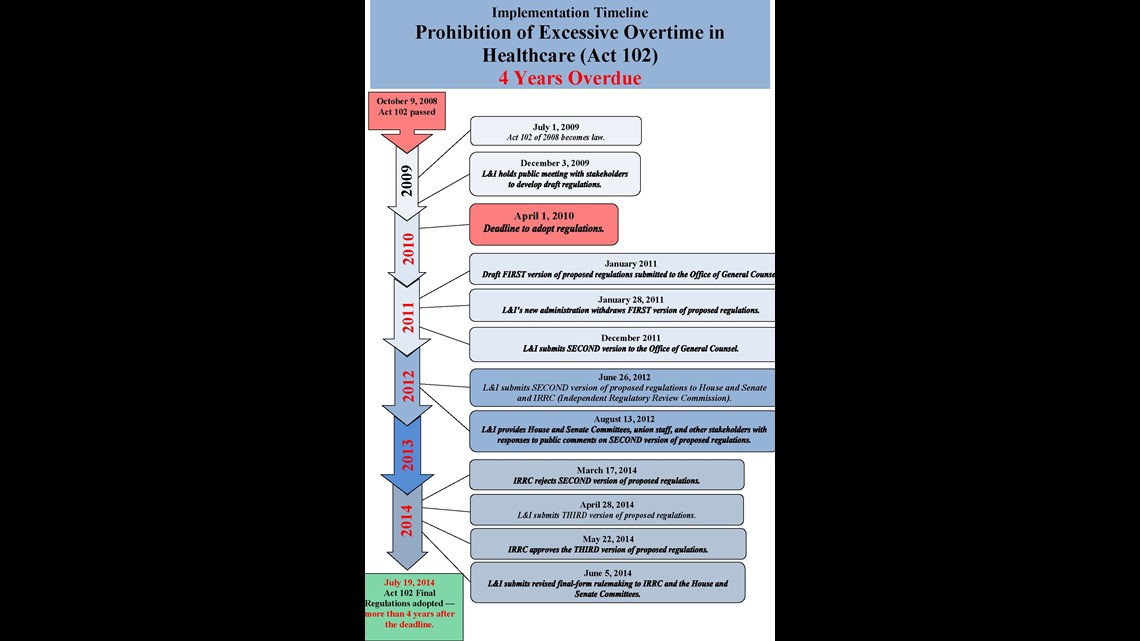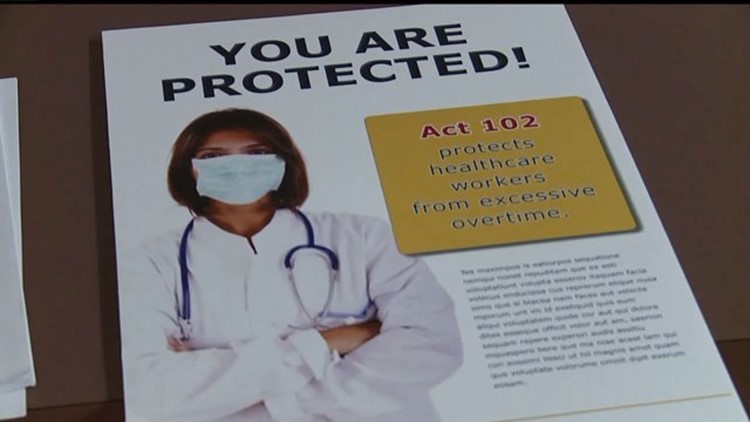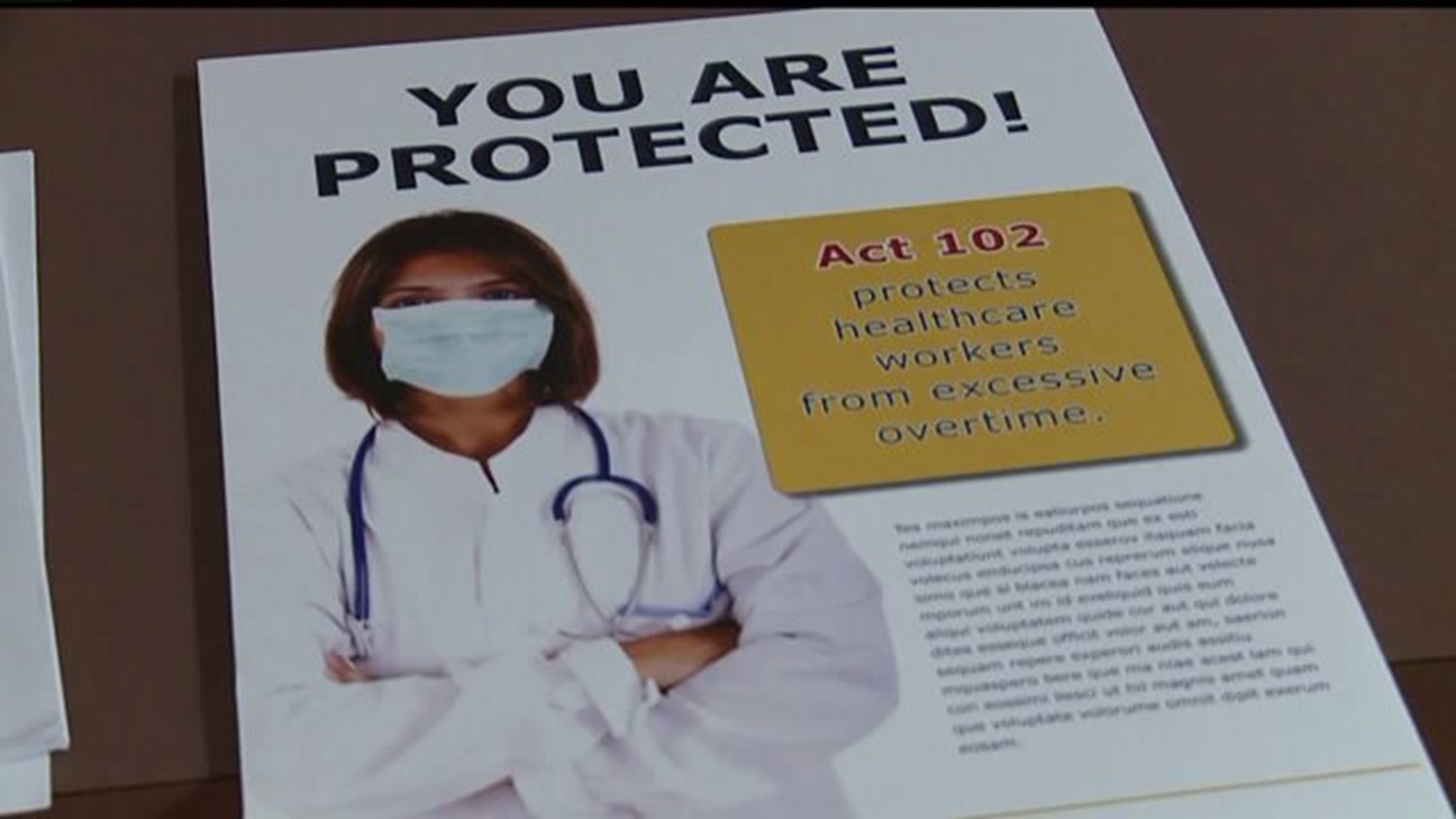

“To put it simply, the implementation of the law to protect healthcare workers and their patients was clearly not a priority at the Department of Labor and Industry,” DePasquale said. “In addition to missing — by more than four years — the legislatively mandated deadline to adopt regulations to enforce the law, L&I summarily dismissed 8 percent of the complaints it received during our audit period.
“Any law is only as good as its enforcement and L&I was woefully unprepared to enforce the new law.
“Overall, our audit found conditions were ripe for a ‘perfect storm’ of inadequate enforcement by L&I because of its poor complaint tracking system, lack of staff and failure to implement consistent regulations for several years.”
Act 102 of 2008, the Prohibition of Excessive Overtime in Healthcare Act, limits healthcare facilities including hospitals, nursing homes and outpatient facilities from requiring hourly, non-supervisory employees involved in direct patient healthcare to work more than agreed to, predetermined and regularly scheduled work shifts.
DePasquale noted that L&I was very cooperative during the entire audit which covered July 1, 2009 — when the full act went into effect — through Aug. 31, 2014.
The audit report includes two findings and makes nine recommendations to correct deficiencies. L&I agreed with the findings and recommendations.
DePasquale said problems with the implementation and enforcement of the act stemmed, in part, from a long — more than four-year — delay in putting regulations in place to clarify complaint investigation procedures and aid in the penalty assessment of the act.
Act 102 mandated that regulations to implement the act be adopted within 18 months of the law’s passage — by April 1, 2010. The regulations were not adopted until July 2014.
“For more than four years after the act went into effect, L&I lacked the necessary regulations to enforce the law,” DePasquale said. “Without the regulations, the department didn’t have the tools it needed to fully protect healthcare workers and the patients they serve.
“Not having regulations providing legal enforcement authority for a law is akin to having a car without an engine.
L&I said it had regulations drafted and submitted within nine months of the April 2010 deadline, but in 2011 a new gubernatorial administration believed those regulations ‘exceeded’ the scope of the statute and revoked the draft rules before they could be reviewed by the Independent Regulatory Review Commission.
In addition to failing to develop regulations on time, auditors found that L&I failed to ensure that all Act 102-related complaints were recorded, investigated and resolved while the regulatory process was underway.
“L&I’s complaint tracking system is too rudimentary for its needs,” DePasquale said. “It reminds me of the inadequacies identified in our audit of the Department of Environmental Protection’s water quality programs associated with shale gas well drilling.
“There must be a solid system available to respond to and track complaints and maintain accurate case records and outcomes — that system was lacking at DEP and, here again, it is missing at Labor and Industry.”
When auditors looked at L&I’s complaint tracking data, they found that 8 percent of the 1,246 total Act 102-related complaints received by L&I were closed without documenting any investigation.
“Because the department summarily closed 8 percent of the complaints files, the actual merits of the allegations will never be known,” DePasquale said.
In addition, when the auditors looked at actual case files for a sample of 47 complaints:
- 87 percent had documentation that was so poor that auditors could not determine how long it took L&I to respond or resolve the complaints;
- investigative reports were completed in only 55 percent of the cases;
- closure letters were sent to the employees in just 57 percent of the cases and to the healthcare facilities in just 23 percent of the cases; and
- L&I investigators asked the employee for permission to disclose their identity to the healthcare facility only 28 percent of the time.
The audit report makes nine recommendations for L&I including:
- ensuring that regulations relating to Act 102 are fully and consistently enforced;
- reviewing similar Act 102 laws and regulations in other states to identify areas where its regulations could be made more effective and efficient;
- working with the General Assembly and the governor’s office to craft any necessary revisions to the existing law;
- developing an improved case management system that will aid its Bureau of Labor Law Compliance in tracking and resolving Act 102-related complaints and do a better job monitoring response performance;
- improving the level of customer service provided to complainants;
- ensuring greater adherence to its internal policies and practices; and
- appointing a permanent director to the Bureau of Labor Law Compliance and ensuring that the bureau is fully staffed with enough investigators to meet workload demands.
“I am extremely encouraged by acting Secretary Manderino’s desire to do everything possible to properly implement, publicize, and enforce the provisions of Act 102 to protect healthcare workers and their patients,” DePasquale said.
“This is the way audits are supposed to work: we do the audit and make recommendations for improvement, and the organization uses our recommendations to make government more effective and efficient.”
A copy of the Prohibition of Excessive Overtime in Healthcare Act 102 audit report is available here.
More information on the Prohibition of Excessive Overtime in Healthcare Act, including frequently asked questions and a complaint form, is available on L&I’s website




